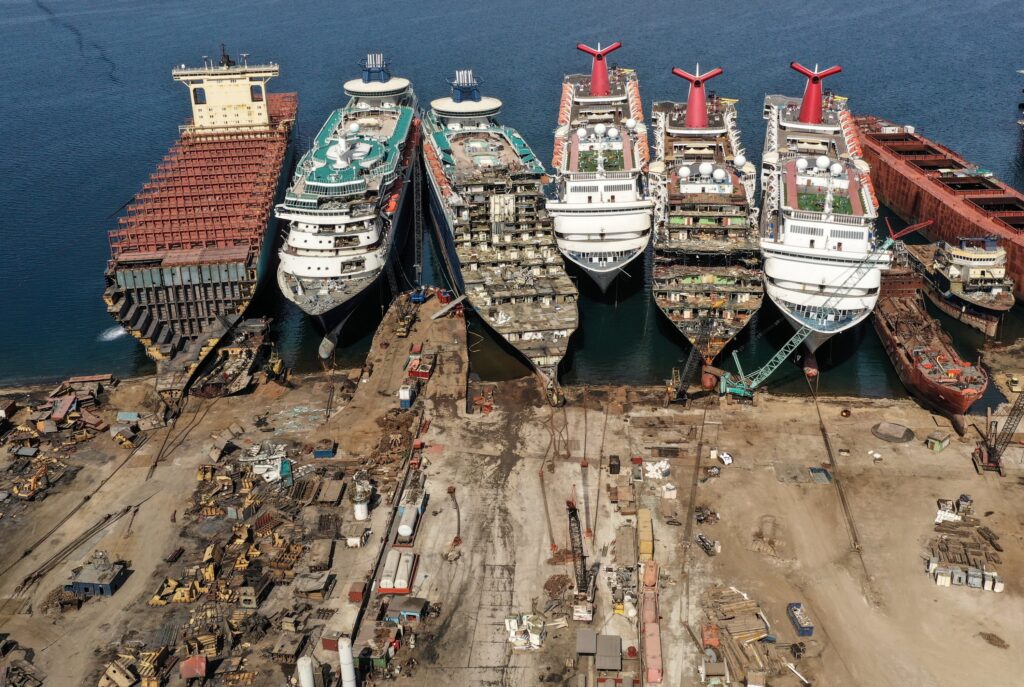Navigating the Challenges: A Closer Look at the Global Ship Recycling Markets
World’s well recognized cash buyers of the ships for recycling GMS in their weekly ship recycling market report opined that, in the intricate web of the global ship recycling industry, recent weeks have witnessed a significant decline. This downturn has particularly impacted India, a leader in this market, where vessel prices plummeted by around USD 20 per Lightweight Displacement Tonne (LDT). At the same time, Bangladesh and Pakistan find themselves struggling to secure the necessary financing to establish functional Letters of Credit (L/Cs), essential for their operations.
Amidst these challenges, an unexpected scarcity of viable candidates has emerged. Surprisingly, this scarcity has inadvertently put a brake on the worsening recycling sentiments. The few units still available in the hands of Cash Buyers might soon receive offers that outweigh their earlier lucrative deals, making their recent transactions seem like more trouble than they were worth.
Adani MegaScam: Congress Alleges Crony Capitalism and National Security Threats
Adding complexity to this scenario, there has been a notable rise in Container and Dry Bulk freight rates over the past months. This increase has diverted the supply of vintage assets away from recycling destinations. Looking ahead to 2024, a surge in tonnage is anticipated, with all locations, especially those in the sub-continent, expected to buzz with activity once again. However, even in Alang, a major ship recycling hub in India, industry insiders are cautiously optimistic. Many are anticipating that the next round of sales will likely occur at lower numbers, mirroring the recent correction in rates. Recyclers are adopting a wait-and-watch approach, closely monitoring market movements before making firm offers on tonnage once more.
On a different front, the Turkish market stands in a weakened state, isolated amidst negative sentiments. Fundamentals are wavering, and there is an ongoing shortage of tonnage. This scarcity is posing a challenge to local businesses, making sustainability an increasingly ambitious goal.
In the midst of these challenges, it becomes evident that addressing the ongoing economic and financial issues is crucial, especially for markets like Bangladesh and Pakistan. Restoring stability to these markets should be a priority.
Echoes of Dissent: Ship Breaking and Environmental Crisis in Union Bay
Bangladesh and Pakistan are grappling with the need for viable financing options. Establishing workable Letters of Credit (L/Cs) is fundamental to their operations. Without stable financial support, these countries face hurdles in navigating the complex waters of the ship recycling industry.
Meanwhile, India, a stalwart in ship recycling, has experienced a drop of USD 20 per LDT in vessel prices. This unexpected decline has put pressure on the market, leading to a reevaluation of deals and making recent transactions appear less lucrative in hindsight. Cash Buyers, holding a limited number of units, find themselves in a unique position. The scarcity of options might lead them to reconsider their pricing strategies, potentially resulting in more favorable offers for sellers.
The rise in Container and Dry Bulk freight rates has diverted vintage assets away from recycling destinations. While this has provided temporary relief, experts predict a surge in tonnage in 2024. Alang, a significant recycling hub in India, is cautiously optimistic. Industry insiders anticipate that future sales might reflect the recent correction in rates. Recyclers are adopting a prudent approach, observing market dynamics before making firm commitments.
In contrast, the Turkish market remains in a fragile state. Negative sentiments and a shortage of tonnage are hindering local businesses. Sustainability is becoming an increasingly ambitious goal in this challenging environment.
In conclusion, the ship recycling industry is navigating a complex landscape. While challenges persist, there is hope on the horizon. Addressing the economic and financial woes in key markets is imperative for restoring stability. Collaboration, strategic planning, and adaptability are key to overcoming these challenges. As the industry prepares for the future, resilience and innovation will be the driving forces shaping its trajectory.







